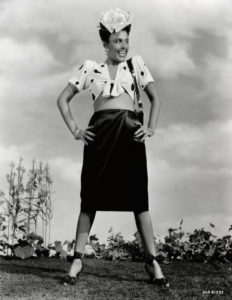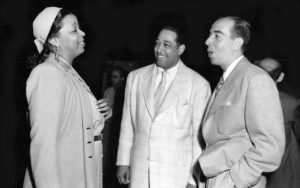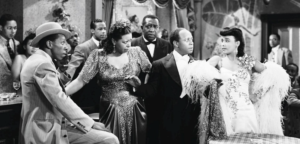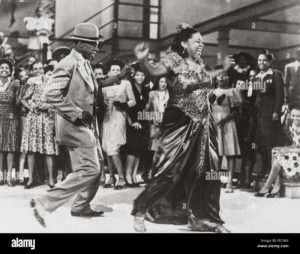Reposting this essay I wrote twelve years ago about Vincente Minnelli’s 1943 classic all-Black musical because a.) people besides me like it a whole lot and b.) because of its more-timely-than-ever admonitions against too-easy dismissals of what is believed to be Anachronistic and (thus) Patronizing. Also if you’ve never seen it before and it happens to come your way again, jump on it. You won’t be sorry.
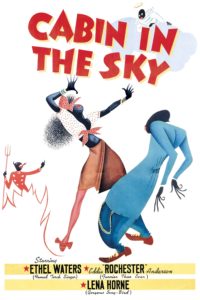
At the hinge of the 1960s and 1970s, Cabin in the Sky embodied everything we young, gifted, and solemn black college students thought we were fighting against. All we blinkered baby cultural-nationalists could see back then in those idyllic depictions of small-town African American folk life were unhealthy levels of honeysuckle and hambone. Eighty-six those rolling dice and eyeballs, all that cornball piety and undignified shucking! Is that really what we wanted our collective profile to look like after King and Malcolm and countless others had died for our advancement?
It’s a measure of how much time has passed that I can’t even LOOK at that previous sentence, much less write it, without wincing; the same kind of wincing we aforementioned Children of the Movement were doing whenever Cabin poked out from TV’s wee-hour wilds or was screened at collegiate film societies. Exaggerated nose-turning-in-a-vertical-direction is at least as embarrassing as pronounced eye-rolling – and not nearly as funny. Given the choice between retroactive scoldings from what some new-jack pundits have come to label the “soul patrol” and the to-be-or-not-to-be anxieties displayed by Eddie “Rochester” Anderson, I know whose party I’d rather go to.
The distinction no longer needs raising. A few days ago, I’d hosted a screening of Cabin for a Wednesday-night Lenten supper at our predominantly black Episcopal church in lower Manhattan. It was a small audience, mostly older and just about all of its members had seen the movie before and loved it without predisposition or qualifiers (even though the DVD released three years ago opens with Warner Home Video’s contemporary disclaimer apologizing about “stereotypes” that were “wrong then and wrong now.”) The tiny audience appeared to appreciate the concern, though it didn’t need to be told what was or wasn’t appropriate. They just wanted a warm black-and-white memory bath. Even the sole 20-something in the room, recruited to help with projection, was caught up in a movie old enough to be his (grand) mother.
Each time I see the movie, I’m more galvanized by the sheer magnetism of its performers. Even in the reproachful seventies, it was hard not to be waylaid by the glory that was Lena Horne in her twenties. What she was then and what she remained throughout the sixties and beyond was so legitimate & enduring to young black fogies like us that we gave her quick dispensation for Cabin; the kind of pass that that didn’t easily go to, say, Ethel Waters (about whom, more later),“Rochester” Anderson or John “Bubbles” Sublett, whose song-and-dance recital of “Shine” is at once the movie’s most glaring anachronism and its most flamboyant affirmation of poise and skill.
Which in no way slights everyone else in the movie, though you wish Louis Armstrong got to do even a little bit more than set off a few elegant licks while wearing those ridiculous devil’s horns. You also wish you could see more of Duke Ellington’s orchestra at work beyond flashes of its suave, imperturbable leader. (That IS Johnny Hodges in the front with the alto, right?) But first-time director Vincente Minnelli was too caught up in the dancing and singing – and rightfully so. His own eye is so greedy and avid for movement and energy that you can almost feel him sitting next to you as you’re looking for the next big moment.
Almost all of which moments are owned by Waters. Donald Bogle has elsewhere noted how often contemporary audiences are drawn to screenings of Cabin by the promise of seeing the young, cat-like Horne, yet leave those screenings dazzled by Waters’ charisma. If younger moviegoers had easy access to Waters’ recordings from the 1920s and 1930s, they’d be better prepared for her vocal agility. (Critics and historians, not that anyone pays them any mind, argue with conviction that Waters’ chops as a singer were the equal of Armstrong’s – and that her influence on jazz singing was just as emphatic & far-reaching.)
But hardly anyone at any age is prepared for the moment when Waters’ Petunia, backsliding into “sin” to “save” Anderson’s Joe from the Devil’s clutches, sashays into a startlingly graceful jitterbug with Sublett’s Domino. One has read in books about both women of tension between Horne and Waters throughout Cabin’s shooting. (In her own memoir, His Eye is On the Sparrow, Waters doesn’t go into detail about the friction except to say that she “won every battle” and that her scrapes kept her away from the movies for another six years.) Whether Waters ended up dominating Cabin by fair or foul means, her triumph endures just as Dilsey, the character she played in her last film, 1959’s The Sound and the Fury, endured.
After the church screening was over, I asked the audience if there were still aspects of the movie that offended or seemed out-of-date. No one could think of any – and I honestly couldn’t come up with any that mattered. I do wish, in retrospect, that I’d asked them if it seemed as though the folks who were either in hell or engaging in “sinful” partying had a better time – and heard better music – than those who stayed close to Petunia’s righteous path. I decided against bringing that dilemma up in a Lenten discussion, though it now strikes me that there were folks willing to talk it over.
I did, however, bring up the closest present-day corollary to Cabin in the Sky’s blend of low comedy and Manichean melodrama: the films of Tyler Perry, especially those featuring Madea, Perry’s pious, pistol-packing alter-ego. Since I knew that all those assembled had seen more than one Perry movie more than once, I asked if there was any real difference between the depictions of black life in Cabin and those in, say, the recently released Madea Goes to Jail. They said there were none; a surprise to me since I expected them to mention the relative rawness of Perry’s depictions of single motherhood, class animus and teen pregnancy. Cabin’s dichotomy between Petunia’s milk-and-honey world view and the temptations of the flesh embodied by Horne’s duplicitous Georgia Brown seem like old school Disney by comparison. But in both cases, a simplistic (as opposed to simple) solution to mortal weakness and moral sloth is submitted to audiences for whom broad laughs and big emotions are the only justifications for entertainment.
Perry continues to astound the mainstream (white) world with the bushels of money he reaps for his movies. And his entrepreneurial moxie serves as a reminder that, unlike the 1940s (or the two decades subsequent to or preceding them), it’s possible for African American artists to have some control over how they’re depicted on screen, for better or worse. I still wonder whether future generations of black people will someday accuse his work of, at best, being too over-the-top or (so to speak) too black-and-white in their moralistic aims. I doubt it somehow. But of one thing I have no doubt: Madea, whatever her own martial skills or swaggering mojo, is no Ethel Waters.

